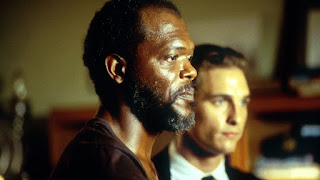Faith in Film, Week 8
"What is it in us that seeks the truth?" - Jake, "A Time to Kill"
There are movies that just stick with you. For me, that movie has always been "A Time to Kill." I first saw it when I was in high school, and it's always been a movie I've come back to. At times in my life it was in different places on my all time list, but for the last decade plus it's been right at the top, my favorite movie of all time.
And there's a lot that I like about the film. There are a lot of themes it explores in a powerful way. It considers marriage, and fidelity in marriage. It looks at society and race relations, and it presents a pretty warts and all view of race relations in our country, and makes a powerful statement there. But to me, this has always been a film about justice.
It's my favorite movie of all time, but it's one I don't agree with. It presents the quintessential view of American justice, but I think it's off from Biblical justice, and we'll talk about that tonight.
This story comes from John Grisham, and it was actually his first novel. Grisham started is career as a trial lawyer, and by 1984 he was also serving as a member of the Mississippi House of Representatives for DeSoto County. While at the courthouse in 1984, he sat in on the trial of a man accused of raping two young girls. In this case, the girls, one 12 and one 16, were white and their attacker was black. But he became taken with the case — more specifically he wondered, “what would have happened if the girl's father had murdered her assailants.” He said he remembered how the jurors cried as the young girl described her attack, and he began writing. A part of the inspiration for him was also the classic novel, “To Kill A Mockingbird.”
There is never a question about whether Carl Lee Haley, the protagonist, committed the crime. He did it, and he's not sorry he did. In the book, the true issue, of which everybody is acutely aware though it is never mentioned in open court, is the right to private, extrajudicial revenge. There is no such right recognized in American law, but as depicted in the book, in the prevailing social conventions such a right is generally accepted and taken for granted. Throughout the book, numerous minor and major characters, including Brigance himself, repeatedly express the opinion that in the case of rape, and certainly in the case of a particularly brutal rape of a very young girl, the victim's father is entitled to exact revenge on her rapists. Many characters say outright that such an act of revenge should not only be condoned but also praised. It is taken for granted by everybody that, had it been a white father on trial on identical charges, an acquittal would have been a certain and foregone verdict. The only real question at issue is whether or not such a socially-recognized right of private revenge would also apply to a black father taking revenge on white rapists. The jurors' deadlock is broken when a female juror makes an emotional appeal to her fellow jurors, asking them to imagine how they would have ruled if "a white, ten-year-old blonde and blue-eyed girl" had been raped and brutalized by two drunken blacks. All jurors viscerally agree that in such a case they would have acquitted a vengeful white father, which leads them to agree that a black father deserves the same verdict.
And in the film, Carl Lee is similarly acquitted by the jury following Jake’s closing. And the film treats it as the correct, and a happy result. And we probably all, to some degree, feel relief. We have come to know and love Carl Lee, and he’s treated as a hero in the story. But was this justice? In our country, I feel like it would be considered a just outcome. We are a nation that seems to worship anti-heroes, and men who take the law into their own hands.But is it justice in God’s eyes?
Some lean on the old “eye for an eye” verse. I, however, am moved by a parable Jesus told in Matthew 13, where the evil one sows weeds among the wheat. The workers ask the vineyard owner if they should pull the weeds. Matthew 13:29-30 says, “‘No,’ he answered, ‘because while you are pulling the weeds, you may uproot the wheat with them. Let both grow together until the harvest. At that time I will tell the harvesters: First collect the weeds and tie them in bundles to be burned; then gather the wheat and bring it into my barn.’” We are not the ones responsible for making sure justice is done, God is. I love “A Time to Kill.” I love that it’s thought provoking. I love the characters and the writing. It is a film that stirs my emotions and makes me think. But I think its depiction of justice is a dangerous one that is in opposition to Scripture.
I'm looking forward to tonight's discussion.
Discussion Questions:
1. Did this film work for you, why or why not?
2. What does the Bible have to say about Justice? What is our role in making sure that Justice is done in this world? What does the church say about Justice?
3. Some feel this film represents the quintessential American view of justice. How do you feel about the outcome of the trial? What does it say about our country? How does it compare to our Biblical notion of justice?




Comments
Post a Comment